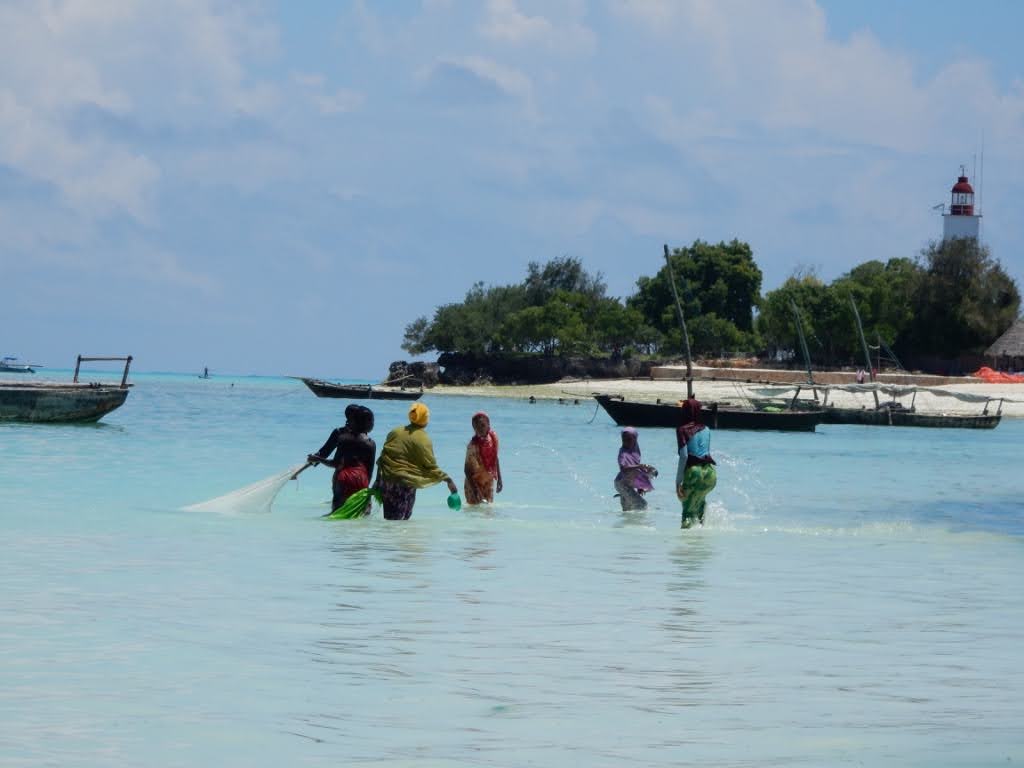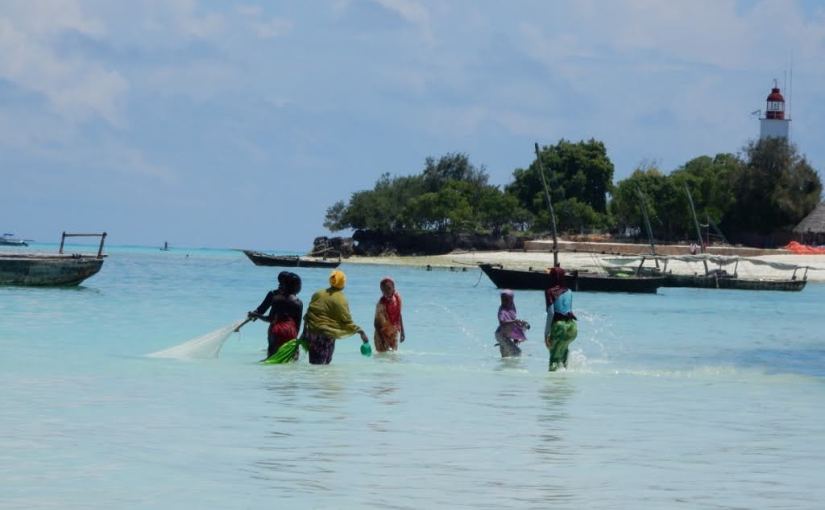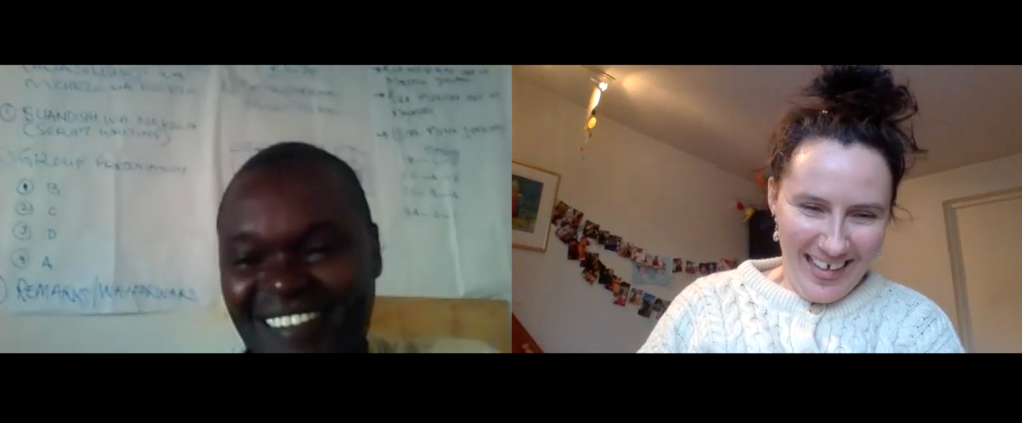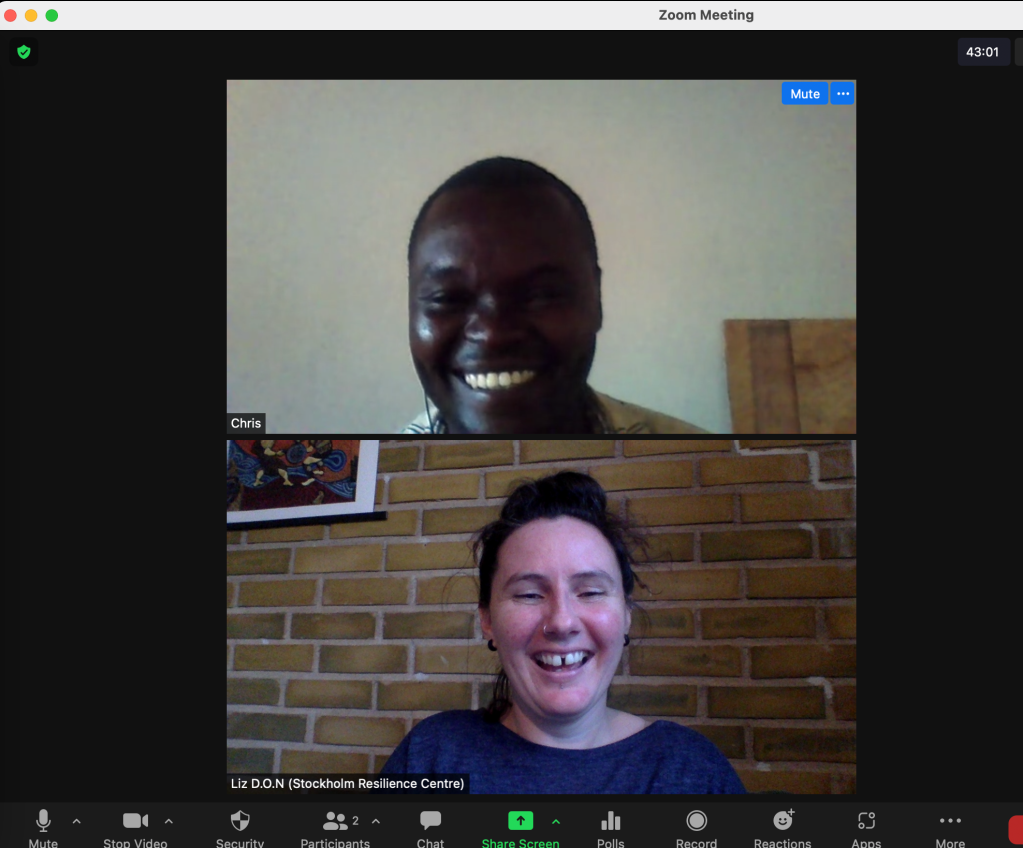Liz: Hi all this is Chris and Liz again from the FoRel project!

A project which aims to explore perceptions of climate change on the Kenyan and Mozambican coast from the perspective of communities experiencing it firsthand. We specifically look at climate change as connected to the multiple other challenges that occur along these tropical coastlines which can affect social-ecological wellbeing and natural resource management. The project uses a framework based on relationality, which puts relations rather than objects or things at the centre and sees human and environmental networks of relations as inseparable and under constant change. Community forum theatre, focus groups and interviews were used as methods over the past two years with fishers, seafood traders, shop owners, food vendors and other types of people living on the East African coast in low-income settings.
I’m Liz, a researcher supporting and learning in this project at the Stockholm Resilience Centre. And this is Mr Chris Cheupe, our main man in Kenya leading and developing this project. This is our third story in the storytelling series Tales of Change from Kwale Coast. And it’s also the last narrative that came out of the fieldwork in Kenya that was centred around social issues. It is very much linked to the first two stories Them youths got no discipline and Digital Times. The many stories about early pregnancy that research participants wanted to discuss were embedded in the ideas of modernity or the digital times that we are now in and with the lack of discipline with the youth. So the three stories very much come together under a broader narrative about societal change universally experienced. Our next stories in this series will jump into the ecological narratives that were built up with participants’ stories in the field. Over to Chris!
Hi, my name is Christian from Wildlife Conservation Society, Kenya and the FoRel project. Together with Liz we are going to tell you a story. The story is based on the findings of FoRel work done Msambweni (Kwale County, Kenya). It is a true reflection of the community and its social problems. The title of this story is “Babies Coming Early”.
Babies coming early!
“Her dreams will be dead”
The main characters are the young girls of Msambweni, the secondary characters are the boys who impregnate them.
Background: Women are giving birth earlier now, early pregnancy is a trend and it’s not a good thing. It emerged in the 80s when boys and girls started to sit together in class, we sat three people at a desk, until the curtain of shyness was removed, there was now no respect for each other. Family planning is now available, injections and condoms were not available to Grandparents generations, they were waiting for their time, but now with family planning, Girls in class 6 will be educated about it. They think now they have access to contraception, which is the fault of the government, they think they can be free. Without school because of Covid, 80-90% of girls are behaving badly. Currently the village is full of pregnant girls, when schools reopen they are parents too! Due to corona they have no place to go or job to do. Mobile phones allow girls to interact with boyfriends on whatsapp or facebook, they can also see dirty things, phones contribute. Also the homestead, if a girl has no job or her personal needs are not taken care of, she will look for a boy to support her. Parents don’t push their children to school or madrasa.
The conflict: This family planning education is affecting the girl’s discipline. She can now play the game without getting pregnant. The Government, with family planning is promoting sex. The government is handing out condoms- are you promoting sex or what? Because the girl uses family planning then she plays the game and there comes a time, after knowing someone then you stop using it, then there is the problem. In the past they were waiting for the right time, now they don’t even complete school. Children nowadays are not serious with education. People are married younger, you will find a child has a child. Now there is freedom, there is no religion denying men to sit with women. We poor have had our children with us during corona, the children are affected two times over, they don’t go to school, they don’t stay indoors, they come to the beach and do things that they were not doing. The rich study online. Girls can lie today about where they go and can be found at the beach with a man and in three to four days pregnant. If they find a boy to support them with some money, the boy wont give freely, he will demand sex and if you accept you will get pregnant. Most men nowadays want working women who can look after them, those men with money want girls or women to destroy or misuse for their own interest. They, the girls, cannot move ahead, they get early pregnancies and become Mama Karangas. Early pregnancies help you to work and do fish trading, that’s why we are selling fish. Unfortunately it’s the girl who will bear the responsibility and her life will be destroyed.
Resolutions: Schools need to be opened. Family planning must be removed, it makes people feel the urge. When a girl is found pregnant only the man is arrested, they should both be arrested and put in jail for ten years, that would be better. Phones are not good for pupils. If your child is missing at home you need to reason where they are at all times. If the child gets a chance they use it. The madrassa will help us. Parents, let’s be strong in taking care of our children. All things we leave to god, we can only talk and warn our girls. Let them see that getting pregnant from a young boy will not help her. Rules from the village chief must be implemented, whoever is caught in the act should have action taken against them. All night celebrations need to be stopped also. We can use the BMUs (beach management units that manage the fisheries locally in Kenya) to stop our children, if we cooperate, all beaches, we can stop them coming. They need jobs and school.
(Note: This narrative comes directly from the voices of those in Msambweni and was arranged into this structure by us to present an accessible tale of the changes coastal communities experience today, how they view and understand them plus what solutions they see.)
Listen to the episode here:



